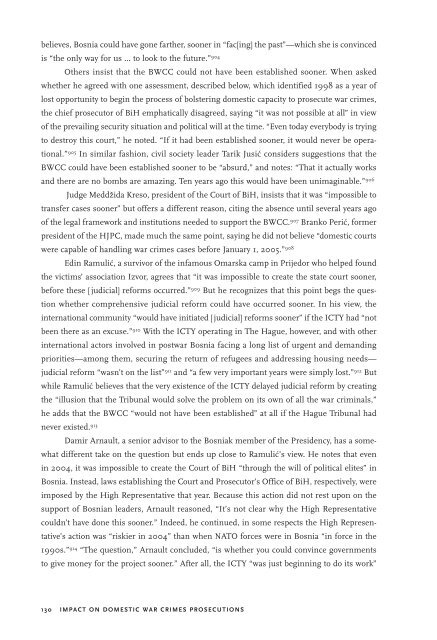That Someone Guilty Be Punished - Open Society Foundations
That Someone Guilty Be Punished - Open Society Foundations
That Someone Guilty Be Punished - Open Society Foundations
Create successful ePaper yourself
Turn your PDF publications into a flip-book with our unique Google optimized e-Paper software.
elieves, Bosnia could have gone farther, sooner in “fac[ing] the past”—which she is convinced<br />
is “the only way for us … to look to the future.” 904<br />
Others insist that the BWCC could not have been established sooner. When asked<br />
whether he agreed with one assessment, described below, which identified 1998 as a year of<br />
lost opportunity to begin the process of bolstering domestic capacity to prosecute war crimes,<br />
the chief prosecutor of BiH emphatically disagreed, saying “it was not possible at all” in view<br />
of the prevailing security situation and political will at the time. “Even today everybody is trying<br />
to destroy this court,” he noted. “If it had been established sooner, it would never be operational.”<br />
905 In similar fashion, civil society leader Tarik Jusić considers suggestions that the<br />
BWCC could have been established sooner to be “absurd,” and notes: “<strong>That</strong> it actually works<br />
and there are no bombs are amazing. Ten years ago this would have been unimaginable.” 906<br />
Judge Meddžida Kreso, president of the Court of BiH, insists that it was “impossible to<br />
transfer cases sooner” but offers a different reason, citing the absence until several years ago<br />
of the legal framework and institutions needed to support the BWCC. 907 Branko Perić, former<br />
president of the HJPC, made much the same point, saying he did not believe “domestic courts<br />
were capable of handling war crimes cases before January 1, 2005.” 908<br />
Edin Ramulić, a survivor of the infamous Omarska camp in Prijedor who helped found<br />
the victims’ association Izvor, agrees that “it was impossible to create the state court sooner,<br />
before these [judicial] reforms occurred.” 909 But he recognizes that this point begs the question<br />
whether comprehensive judicial reform could have occurred sooner. In his view, the<br />
international community “would have initiated [judicial] reforms sooner” if the ICTY had “not<br />
been there as an excuse.” 910 With the ICTY operating in The Hague, however, and with other<br />
international actors involved in postwar Bosnia facing a long list of urgent and demanding<br />
priorities—among them, securing the return of refugees and addressing housing needs—<br />
judicial reform “wasn’t on the list” 911 and “a few very important years were simply lost.” 912 But<br />
while Ramulić believes that the very existence of the ICTY delayed judicial reform by creating<br />
the “illusion that the Tribunal would solve the problem on its own of all the war criminals,”<br />
he adds that the BWCC “would not have been established” at all if the Hague Tribunal had<br />
never existed. 913<br />
Damir Arnault, a senior advisor to the Bosniak member of the Presidency, has a somewhat<br />
different take on the question but ends up close to Ramulić’s view. He notes that even<br />
in 2004, it was impossible to create the Court of BiH “through the will of political elites” in<br />
Bosnia. Instead, laws establishing the Court and Prosecutor’s Office of BiH, respectively, were<br />
imposed by the High Representative that year. <strong>Be</strong>cause this action did not rest upon on the<br />
support of Bosnian leaders, Arnault reasoned, “It’s not clear why the High Representative<br />
couldn’t have done this sooner.” Indeed, he continued, in some respects the High Representative’s<br />
action was “riskier in 2004” than when NATO forces were in Bosnia “in force in the<br />
1990s.” 914 “The question,” Arnault concluded, “is whether you could convince governments<br />
to give money for the project sooner.” After all, the ICTY “was just beginning to do its work”<br />
130 IMPACT ON DOMESTIC WAR CRIMES PROSECUTIONS

















